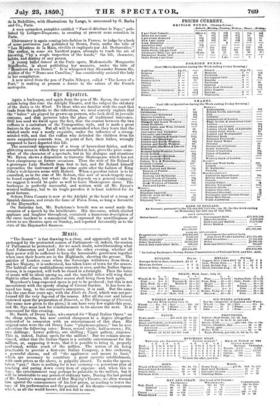ffi it tt4tairts.
Again a burlesque, and again from the pen of Mr. Byron, the scene of action being this time the Adelphi Theatre, and the subject the old story
of the Babes in the Wood. To those who are familiar with the road that leads from the pathetic to the ridiculous, wo need scarcely explain that the " babes " are played by grown-up persons, who look droll in juvenile costume, and that pertness takes the place of traditional innocence. Still less need we dwell upon the fact, that the combat between the two ruffians is a caricature of the Transpontine style, and is made a great feature in the story. But all will be astonished when they learn that the wicked uncle was a needy exquisite, under the influence of a strong- minded wife, and that the ruffian who defended the children from his more sanguinary comrade was, in point of fact, their father, wrongly supposed to have departed this life. The occasional appearance of a troop of benevolent fairies, and the glittering scene in which they are assembled at last, gives the piece some- what of the character of a spectacle, but in his dialogue and situations Mr. Byron shows a disposition to travestie Shakespeare which has not been conspicuous on former occasions. Thus the wife of Sir Roland is a grotesque Lady Macbeth from first to last, and Sir Roland himself reproaches the instrument of Isis crime quite after the fashion of King John's well-known scene with Hubert. When a peculiar talent is to be consulted, as in the case of Mr. Robson, this sort of mock-tragedy may be found expedient, bat where the fun depends on a general company, we suggest it would be quite as well to leave Shakespeare alone. The burlesque is perfectly successful, and written with all Mr. Byron's wonted brilliancy, but to its tragic parodies it is least indebted for its good fortune.
Seiiora Petra Camara is now at the Adelphi at the head of a troop of Spanish dancers, and rivals the fame of Perea Nena, so long a favourite at the Haymarket. On Saturday last, Mr. Buckstone's benefit was as usual made the occasion of a speech by the beneficiaire. His discourse, which elicited applause and laughter throughout, contained a humorous description of the cares incident to a managerial life, expressed the unwillingness of actors to see theatres open on Sunday, and reported favourably as to the state of the Haymarket finances.


























 Previous page
Previous page